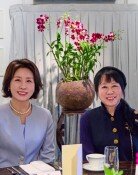[Editorial] Jin`s criticism of political sphere
[Editorial] Jin`s criticism of political sphere
Posted February. 18, 2001 12:48,
Deputy Prime Minister-Minister of Finance and Economy Jin Nyum`s has identified partisan bickering in the political sphere as one of the causes of the nation`s current economic woes. In a speech to the National Assembly Finance-Economy Committee, he pointed out that elections and the need to address political problems made it difficult to tackle economic issues. Jin`s statement deserves earnest consideration from the political sphere.
Early last year, when the nation`s economy was at a crossroads in its recovery from the currency crisis of 1997, those in the political realm and the ruling party in particular made one counter-reformist demand after another of the economic ministry on the eve of the Apr. 13 general election. Such urgent matters as the bailout of cash-strapped investment trust companies, restructuring of the banking sector and privatization of public corporations were put off until after the elections at the request of the political sphere. A set of reform bills on labor issues also was rejected by the legislature.
Compliance with the demands of politicians resulted in a slackening of the sense of urgency created by the currency crisis. Belated attempts to renew interrupted reforms have only deepened social unrest and redoubled the burden upon the people. Until very recently, the National Assembly had still failed to act on various bills with the potential to stem the economic downturn.
Procrastination over urgent budget deliberations kept Jin from his office in the Kwachon government building for ten days, he said. This is just one example of how the political parties` preoccupation with infighting is standing in the way of much-needed efforts to solve economic problems in a timely manner, and is thus badly affecting the people`s livelihood. The partisan confrontation was a major cause of the delayed economic recovery, a fact that should have been obvious to politicians.
Jin spoke of past experience. It is open to doubt whether political logic ever prevails over economic logic. We are led to question whether partisan considerations were part of the equation in the government`s response to the financial plight of the Hyundai Group, which was out of step with its treatment of the Daewoo Group, or its emphasis on job security in the course of restructuring public corporations and banks.
Without a doubt, primary responsibility for implementing economic policies rests with the government. Economic ministers should be held accountable for making excessive demands while under pressure from the political sphere, even though they knew these demands were unfeasible. It is imperative that both the political sphere and the economic administrators reflect upon their past behavior in their efforts to promote reform.
Now that the finance minister has openly recognized the damage done to economic logic by the logic of politics, both economic officials and politicians should do away with selfishness and procrastination when it comes to economic issues.







